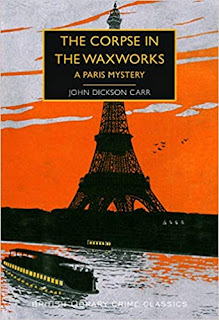Meanwhile I've sorted out all of the books that I've promised to read, listed when I've promised to read them by, and started on some of the books I just want to read too, one of which wad 'The Corpse in the Waxworks, A Paris Mystery', a relatively recent addition to the British Library Crime Classics series.
John Dickson Carr is probably my favourite classic crime discovery. I found him first in the titles that came out from Polygon, and now through the British Library editions (this is the 4th title they've reprinted). There are plenty of ebook titles available, and a host of frustratingly expensive American titles in print, which make me wonder how many more the BL will do. Before I worry about that I still have 'Castle Skull' and 'The Lost Gallows' to get around to though, and they'll hold me for a while.
What I like so much about Carr is the atmosphere he brings to his mysteries. 'The Corpse in the Waxworks' came with an odd sense of déjà vu. I've checked, I didn't already have a copy, but I could have sworn that I'd read the opening chapters somewhere else before. That feeling certainly added to the eeriness of the scene Carr was setting.
Henri Bencolin, head of the Parisian police is taking his friend, Jeff, to meet the owner of a waxworks - a young lady was last seen going into the building before being fished out of the river some time later, stabbed and very dead. It's late at night when the party return to the museum, and find the body of another young woman dead in the arms of a satyr in the chamber of horrors.
The plot from there on in is complicated and I'm not going to pretend that I had any idea of who did it before the end of the book. The final solution does make sense, and there are (sort of) clues leading up to it, but it's also obviously meant to surprise and shock the reader, so for once I'm not overly worried about my failure to work it out. It wouldn't matter anyway because the chief pleasure in this book, and it's a significant one, is in the world that springs off the page. It's almost cinematic - one of those books that I feel like I've watched rather than read. If only people would stop bothering Agatha Christie's books for T.V. adaptations and look at someone like John Dickson Carr - they could have an absolute ball with him.
Here is a Paris of dark corners, and illicit clubs. Badly lit cafes and seedy streets full of young people seeking a thrill well out of sight of their respectable homes. The scenes in the waxworks are masterly (many years ago when York waxworks closed down I went to the auction where everything was sold off, poking around the building to look at the lots even with plenty of other people there felt oddly illicit, this book magnifies that sense of trespass over and again), as are the visits to the parental homes of the unfortunate young women.
There is nobody quite like Carr for almost, but not quite, telling a ghost story. He is so good at the gothic touches that build a scene, and then at giving an explanation which is more or less rational for them. I love a writer who can play this sort of game with their readers, and it's exactly what I want to distract me from the current news cycle and the general bleakness of lock down life.

I agree that there are other mystery novels other than the Agatha Christie ones that could make great TV viewing. Georgette Heyer's name springs to mind.
ReplyDeleteHer detective books would be great. I remember brilliant adaptations of Dorothy L. Sayers, Margery Allingham, and Josephine Tey from the 1980's, as well as the Ngiao Marsh ones from the same era that I only saw much later. There was even the odd (but entertaining) Diana Rigg version of Gladys Mitchell's books some time in the 90's. I really don't understand the obsession with endlessly adapting Christie when there's such a lot of really good stuff that could supply the same nostalgia hit, and be better suited for exploring some of the themes that keep being imposed on Agatha, regardless of how they fit with her work.
Delete